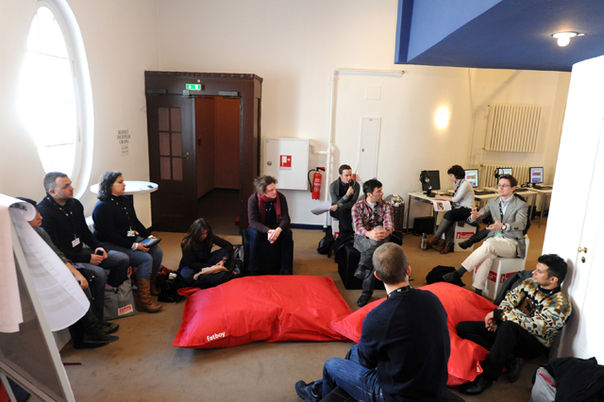The invisible hand of distribution
The Berlinale Talent Campus now extends its reach to the world of film distribution. As the Talents meet up, we report on their discussion and on the issues they face.

The first meeting of Talent Campus distributors
For the first time in the Berlinale Talent Campus' ten-year history, the Campus now includes film distribution Talents. Young, emerging distributors from ten countries met on Saturday to tell their stories and compare notes. Some noticeable trends that surfaced during the discussion included problems with digital conversion and promoting niche markets (documentary, art house and foreign cinema) which are a tough sell in their respective countries dominated by mainstream and/or Hollywood cinema.
Despite the sometimes unsurmountable obstacles faced by these young entrepreneurs, they are an integral, if often invisible force in the film industry. Sigrid Limprecht, head of the Bonner Kinemathek who helped to found and organize the distribution programme for Talent Campus, believes the profession should be recognised as part of the creative process in the production cycle. “It’s kind of a misunderstanding that you can only talk or think about a film after seeing it“, she says, but it’s a misconception she hopes to change given this year’s Talent Campus theme: Changing Perspectives. “We need changing perspectives because if we don’t look for talent in distribution then we will have a huge pile of products and nobody’s seeing it.“
The countries represented in the distribution programme include Mexico, Argentina, UK, India, Germany, Norway, Macedonia, Belgium, Puerto Rico and Turkey. One of the Talents, British distributor Oli Harbottle's company Dogwoof specializes in international documentaries inside the UK. DVD and video-on-demand (VOD) distribution is their main market because multiplex chains ask distributors for a 16-week window between theatrical distribution and DVD/VOD releases.
The delay can cause a loss in revenues, which is why Dogwoof opts for DVD/VOD. “A core thinking in our business is to get the films out as widely as possible as quickly as possible“, he says. “The decision is: do we want to be in a handful of theatres where it’s not really our audience anyway for the sake of losing eight weeks of potential revenues?“
In contrast, Mexican distributor Estrella Araiya does not engage in the VOD business because of the scarcity of high-bandwidth access in the country. Unlike the UK, digital technology is slowly catching up in Mexico – this includes digital projection equipment. The 80 independent theatres her companies, Kid Sister and Vendocine, partners with will be slow to switch to digital projection due to the high costs involved. Obtaining 35mm prints is dependent on the filmmaker, but in cases where there is no print available Araiya produces a Blu-ray version to screen in theatres. “Changing Perspectives“ is a theme with many applications in the film industry, and the painful digital evolution apparent in film distribution is no exception.


301 Moved Permanently